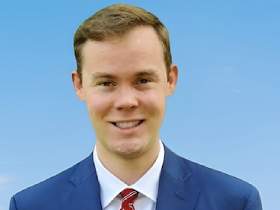
Niagara Region alone needs an additional 81 family doctors to address the system’s shortcomings. Photo Credit: Shutterstock.
As the population of Niagara continues to grow, the need for quality, accessible medical care has never been greater. It is estimated that roughly 30 per cent of residents currently do not have their own family physician, with that percentage expected to grow exponentially in the coming years. Similar shortages exist across the health-care sector, where there are not nearly enough nurses, nurse practitioners, surgeons and specialists to meet the demand.
Bryan Blue is a St. Catharines resident who currently serves as an Economic Sectors Business Development Manager at Destinations Canada. He has previously held various business and economics roles in both the private and public sectors.
“I think we need to do a better job of recognizing the skills and experience of newcomers,” Blue shared in a recent sit-down with the Niagara Independent, reflecting on the crisis of new Canadians who have qualifications in the medical field, yet are struggling to obtain the paperwork necessary to assume positions in their areas of expertise.
On Feb. 6, during a meeting of the Niagara Regional Health and Social Services Committee, some startling facts were revealed. Nationwide, barely 400 new physicians are coming out of Canadian education programs per year, according to the Physician Recruitment 2023 Annual Review, delivered by Physician Recruitment Retention Coordinator Jill Croteau. Putting this into perspective, Croteau presented that the Niagara Region alone needs an additional 81 family doctors to address the system’s shortcomings. Moreover, the report also revealed that most of the graduates of these programs are choosing specializations other than family medicine.
In general, foreign doctors immigrating to Canada are required to complete an arduous and expensive five-year equivalency training process that includes the Medical Council of Canada Qualifying Exams. While exceptions have been created for physicians coming from Australia, Ireland, the United Kingdom and United States, many new Canadians, and specifically foreign doctors coming to Niagara, are not native to one of these locations.
“I was recently speaking to a new Canadian resident from Nigeria,” Blue shared. “He explained to me the hurdles that his wife, who is a physician, was attempting to overcome in order to practice medicine in Canada. The process is so complicated and difficult that they are preparing to leave Canada for the United Kingdom, where his wife will be able to work in her field.”
“I am not a health-care professional, but I am concerned that we are failing the citizens of Canada and subsequently failing our newcomers, as qualified physicians leave for other destinations, while we have so many people who are in need of health services.”
Reflecting on his collaboration with the Internationally Educated Health Professionals (IEHP), Blue, who participated in delegation at the Feb. 22 Niagara Regional Council meeting, says he is ‘cautiously optimistic’ that momentum and progress can be obtained.
“I am incredibly grateful that the Niagara Region gave us a platform to raise awareness on this issue,” Blue said. “I would like to personally thank Mayor Bill Steele, of Port Colborne, MPP Sam Oosterhoff and Regional Councillor Diana Huson, for their keen interest and earnest support.”
Those interested in learning more are invited to view the following meetings:
Niagara Public Health and Social Services Committee Meeting (February 6th, 2024)
Niagara Regional Council Meeting (February 22nd, 2024)
Niagara Region Committee of the Whole Meeting (March 7th, 2024)

Nick Redekop completed his Honours Bachelor of Arts Degree in Labour Studies at Brock University. He has previously served in municipal and federal politics. In his free time, Nick enjoys following sports, taking part in outdoor activities, and reading biographies. Nick resides in Niagara Falls




















